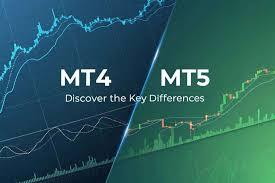Introduction
When it comes to forex and CFD trading, few platforms have had the same impact as MetaTrader. Developed by MetaQuotes Software, both MetaTrader 4 (MT4) and MetaTrader 5 (MT5) have become household names among traders across the globe. While MT4 has been around since 2005 and built a loyal following, MT5, released in 2010, was designed as an upgraded version with more features and advanced capabilities.
This often sparks a debate: MetaTrader 4 vs 5 — which is better? To answer this, let’s explore their similarities, differences, and which platform suits different types of traders.
The Legacy of MetaTrader 4
Launched in 2005, MetaTrader 4 quickly became the most popular trading platform in the forex industry. Its success is largely due to:
-
User-Friendliness: A clean and intuitive interface that made trading accessible to beginners.
-
Custom Indicators & EAs: MT4’s ability to support automated trading through Expert Advisors (EAs) gave it an edge.
-
Broker Adoption: Thousands of brokers worldwide integrated MT4, making it the industry standard.
Even years after the release of MT5, MT4 remains in demand because traders value its simplicity and reliability.
The Arrival of MetaTrader 5
In 2010, MetaQuotes released MetaTrader 5, not as a direct replacement but as a more advanced platform designed to expand beyond forex. MT5 was created to handle trading in multiple asset classes, including stocks, commodities, and futures.
Key strengths of MT5 include:
-
Multi-Asset Trading: While MT4 focuses mainly on forex, MT5 covers a broader range of financial instruments.
-
Faster Processing: MT5 has a more powerful architecture, offering faster trade execution.
-
Advanced Tools: It comes with more built-in indicators, graphical tools, and timeframes.
-
Economic Calendar: Unlike MT4, MT5 features an integrated economic calendar for fundamental analysis.
Despite these advantages, adoption was initially slow because many traders were already comfortable with MT4.
MetaTrader 4 vs 5: Key Differences
To better understand the MetaTrader 4 vs 5 debate, let’s compare the two platforms across various features:
1. User Interface
-
MT4: Clean, simple, and easy for beginners to navigate.
-
MT5: Slightly more modern with additional features, but may feel complex for new traders.
2. Programming Language
-
MT4: Uses MQL4, suitable for forex trading and simpler Expert Advisors.
-
MT5: Uses MQL5, which is more powerful, supports object-oriented programming, and allows for more advanced EAs.
3. Indicators & Timeframes
-
MT4: Offers 30 built-in indicators and 9 timeframes.
-
MT5: Comes with 38 indicators and 21 timeframes, offering more detailed analysis.
4. Order Types
-
MT4: Supports 4 types of pending orders.
-
MT5: Supports 6 types, adding Buy Stop Limit and Sell Stop Limit for more flexibility.
5. Hedging & Netting
-
MT4: Allows hedging, enabling multiple positions in the same instrument.
-
MT5: Supports both hedging and netting, giving traders more options depending on their strategies.
6. Backtesting & Strategy Development
-
MT4: Limited to single-threaded backtesting.
-
MT5: Allows multi-threaded and multi-currency MetaTrader 4 vs 5 backtesting, making it more powerful for strategy testing.
7. Market Coverage
-
MT4: Primarily forex and CFDs.
-
MT5: Designed for multi-asset trading including stocks, commodities, indices, and futures.
Who Should Use MetaTrader 4?
Despite being older, MetaTrader 4 still has a loyal user base. It is ideal for:
-
Beginners: Thanks to its simplicity and ease of use.
-
Forex Traders: Since MT4 is built primarily for currency trading.
-
EA Enthusiasts: With thousands of existing MT4 Expert Advisors available, traders who rely on automation find MT4 convenient.
-
Brokers with Limited Assets: Many smaller brokers still offer only MT4 due to its popularity.
If you want a straightforward platform with a huge community and plenty of support, MT4 remains a solid choice.
Who Should Use MetaTrader 5?
For traders who want more advanced features, MetaTrader 5 is the natural upgrade. It is better suited for:
-
Multi-Asset Traders: Those trading not just forex but also stocks, commodities, or futures.
-
Advanced Strategy Developers: Programmers and algorithmic traders who want more power and flexibility with MQL5.
-
Data-Driven Traders: Thanks to additional timeframes, indicators, and improved backtesting.
-
Fundamental Analysts: The integrated economic calendar makes fundamental trading easier.
If you’re looking for a modern, versatile, and faster platform, MT5 provides the edge.
MetaTrader 4 vs 5: Which One Wins?
When comparing MetaTrader 4 vs 5, the answer depends on your needs:
-
If you are new to trading or focus only on forex, MT4 is simple, reliable, and supported by nearly all brokers.
-
If you are an experienced trader, want multi-asset trading, or rely heavily on automation, MT5 is clearly the better option.
Ultimately, neither platform is objectively “better”—it comes down to your trading style and goals. Many brokers even offer both, giving traders the freedom to choose.
The Future of MT4 and MT5
Although MT5 is the more advanced platform, MT4 is far from obsolete. Its large user base, strong community, and wide broker adoption ensure it remains relevant. That said, MetaQuotes has been focusing its updates and support on MT5, signaling its intention to eventually shift the industry towards the newer platform.
Over time, as more brokers and traders adapt, MT5 may become the standard. But for now, both platforms continue to serve millions of traders worldwide.
Conclusion
The MetaTrader 4 vs 5 debate is one of the most common questions among forex and CFD traders. While MT4 remains a favorite for beginners and forex-focused traders, MT5 offers more advanced tools, faster processing, and broader market access for those looking to expand their trading.
See more our website : visit here



